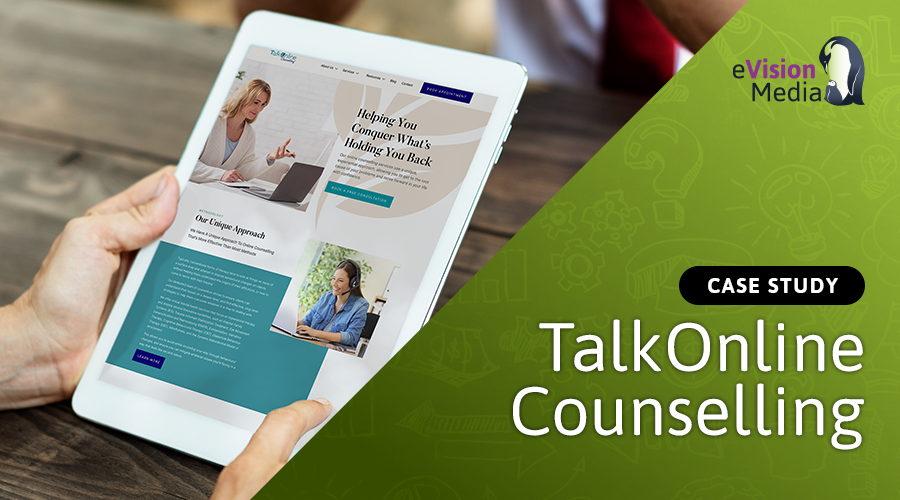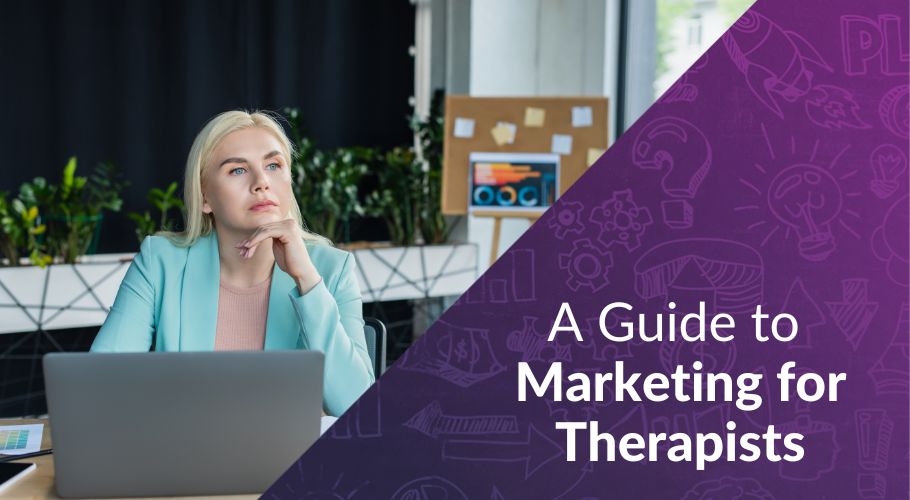As a therapist or clinical counsellor, it can be tough to make yourself stand out amongst the plurality of professionals with whom you’re competing.
All things considered, marketing for therapists can actually be a pretty difficult endeavour, not least here in Canada, where therapists are forced to adhere to some pretty strict guidelines.
However, in spite of these challenges, we’ve worked with several Canadian clinical counsellors, helping them to connect with clients, build their brands, and market their businesses, even while working within the rigid confines of these ethical and professional standards.
But if you’re a clinical counsellor who’s trying to wrap your mind around marketing, it can quickly become incredibly overwhelming, especially when you have limited knowledge of marketing.
So let’s discuss some of the problems you might encounter while staying within the guidelines you’re expected to follow.
This article focuses on the Canadian counselling industry, but these insights may also apply to you if your practice is outside of Canada.
If you’re looking for marketing tips for counsellors, or just trying to figure out where to begin when it comes to marketing your practice, then this article is for you.
The Challenges of Marketing for Therapists
Clinical counsellors in Canada are expected to adhere to high ethical and professional standards of practice, as outlined by provincial regulatory bodies, and professional organizations like the Canadian Counselling and Psychotherapy Association (CCPA).
While these standards are essential for ensuring the well-being and safety of clients, they can pose challenges for counsellors in terms of their marketing efforts.
Here’s how these standards may have an impact on marketing for therapists:
Confidentiality and Privacy
Strict confidentiality is expected to be maintained by counsellors when it comes to client information. This can make marketing difficult because counsellors cannot use client testimonials or case studies without explicit written consent, limiting their ability to showcase success stories.
And as we’ve learned from some of the counsellors with whom we’ve worked, they’re often uncomfortable even asking their clients about testimonials, as they fear it may be taken the wrong way, or in some way violate the standards of confidentiality and privacy that they’re expected to follow.
Informed Consent
Counsellors must obtain informed consent from clients before providing any services. This means that marketing materials must clearly communicate what clients can expect from counselling, which can be challenging to do without making unrealistic promises.
As a result, the clinical counsellors we’ve worked with have been very picky about the language we use to describe what they can do for potential clients, as they’re worried about saying something that might violate this guideline.
Advertising Standards
Professional organizations often have guidelines for advertising that restrict the use of superlatives, unsubstantiated claims, or guarantees of outcomes. This can severely limit the types of marketing messages counsellors can use and typically calls for some very careful and creative wording.
Cultural Competence
Counsellors must be culturally competent and sensitive to diversity, and this is especially true in a country with as diverse a population as Canada. Marketing materials need to reflect this sensitivity and inclusivity, which requires careful consideration of things like language and imagery.
Professional Boundaries
Maintaining appropriate professional boundaries with clients is crucial. So, when it comes to their marketing, counsellors need to be cautious not to blur these boundaries by becoming overly familiar or using marketing tactics that may seem overly intrusive.
Anti-Stigmatization
Counsellors are encouraged to promote mental health awareness and combat stigma. While this is essential, it can make marketing difficult, as counsellors must strike a balance between advertising their services and not contributing to the stigmatization of mental health issues.
Avoiding Dual Relationships
To avoid conflicts of interest, counsellors are advised to avoid dual relationships with clients, which means not making friends with clients or otherwise engaging with them in non-professional capacities. This can make marketing for therapists within small communities or among personal networks much more challenging.
Professional Ethics
Counsellors must adhere to a strict code of ethics, including principles like beneficence, non-maleficence, and respect for autonomy. That being said, marketing for therapists should align with these ethical principles and not compromise client welfare for the sake of promotion.
Now, to be absolutely clear, the preceding points are meant to simply be statements of fact, and in no way am I trying to disparage or criticize these standards, which are obviously there for good reason.
Adherence to these standards is essential for maintaining the integrity and professionalism of clinical counsellors in Canada, but navigating these guidelines to ensure marketing efforts are ethical, accurate, and respectful of clients’ needs and rights can definitely make marketing for counsellors more difficult.
With that in mind, let’s explore how you can stay within these standards, as they relate to several forms of marketing for therapists.
Read: How Brand Positioning Transformed a Counselling Business into a Market Leader

When you’re trying to figure out how to do something, it always helps to look at examples of how other people have done it and model your efforts after what’s already been effective.
This case study details everything we did for our client, TalkOnline Counselling, including their logo, website, content marketing, social media marketing, and more.
So, if you want to learn about branding and marketing for therapists by looking at an example of what we’ve done for one of our clients, then this case study is a must-read.
Our Top Tips on Marketing for Therapists
After working with several clinical counsellors, I’ve learned first-hand how tricky it can be to come up with effective marketing for therapists.
But it’s not as difficult as you might think, especially for someone who’s already familiar with the standards they’re expected to follow, and with a little creativity, and some careful consideration, you can successfully market your counselling business.
That being said, let’s look at how you can effectively market your therapy practice using several common strategies.
SEO and SEM
Therapists and clinical counsellors can ethically use SEO and SEM strategies to market their services effectively online while also upholding professional standards.
When it comes to search engine optimization, make sure to use ethical SEO techniques that prioritize accuracy and transparency. Use relevant keywords, meta descriptions, and valuable content to improve search engine rankings without exaggerating anything or making any claims that would be considered unethical.
Also, don’t forget to optimize your online presence for local searches, using location-specific keywords and making sure to provide accurate business information, which can be essential for attracting local clients and maintaining their trust.
As for the search engine marketing side of things, when running ads on search engines like Google, make sure to meticulously adhere to the ethical advertising guidelines set by provincial regulators and professional associations, and refrain from using sensational language or making exaggerated claims.
Website Design and Development
No matter what kind of business you own, if you want your marketing efforts to be effective, you’ve got to have a website that looks great, functions properly, and provides a great experience for users, and the same holds true for therapists and clinical counsellors. Here are some ways you can go about doing that:
- Ethical Content: Create accurate, evidence-based content, and avoid making any exaggerated claims about the effectiveness of your counselling.
- Informed Consent: Clearly explain your counselling processes and potential outcomes on your website to build trust and help clients make more informed decisions.
- Client Confidentiality: Prioritize client confidentiality and privacy. Do not share personal client stories or testimonials without explicit consent, and even if you do get a client’s consent, make sure to remove any identifying details.
- Professionalism: Make sure to maintain professional boundaries on your website, refraining from personal interactions with clients and clearly stating your professional identity.
- Ethical SEO: Use ethical SEO techniques for better visibility, avoiding misleading tactics and ensuring accurate meta descriptions, keywords, and content that’s directly relevant to what you do and provides value for users. And don’t forget to optimize for local search, as well.
- User-Centric Design: Ensure that your website prioritizes the experience of users by making it easy for potential clients to get in touch with you and find essential information. It’s also a good idea to create an FAQ page on your website that addresses common questions about counselling and your practice in particular.
- Privacy and Security: Implement strong privacy and security measures to protect client data and maintain trust.
- Online Booking: Offering convenient online appointment booking through your website is essential, but make sure that it respects client privacy and is as secure as possible.
Social Media Marketing
Social media is one of the best marketing tools for any business owner, but standards of practice can make it considerably trickier for therapists and clinical counsellors.
Here are some tips for effectively and ethically marketing your counselling business on social media:
- Educational Content: When it comes to marketing for therapists, one of the best ways to use social media is by providing educational content that can help users and display your expertise. But try to focus on general mental health and well-being information, and avoid giving personal advice or diagnoses.
- Awareness and Stigma Reduction: Doing what you can to raise awareness and reduce stigma surrounding mental health issues is another great content strategy for social media. One of the ways to do this is by creating informative posts that explore relevant statistics and discuss common mental health issues.
- Client Testimonials: If you’re comfortable with doing this, and absolutely sure it adheres to the ethical guidelines you’re expected to follow, highlighting client success stories is one of the best ways for you to build trust and credibility on social media. But make sure to get written consent and avoid disclosing any identifying information.
- Sharing Tools and Resources: Another great way to leverage social media as a clinical counsellor is by providing links to reputable resources and organizations, and sharing tools and techniques that potential clients can use to improve their mental health and well-being.
- Ethical Advertising: If you’re going to run paid ads on social media, make sure to stringently adhere to all the relevant standards of practice, like avoiding misleading and sensational language.
Content Marketing
If you’re a therapist or clinical counsellor, content marketing offers one of the best ways to showcase your expertise and unique approach, which can help to build trust and credibility with potential clients.
With that in mind, here are some tips to help you make the most of your content marketing:
- Educational Blog Posts: Creating a blog on your website gives you the opportunity to share informative articles about mental health topics, coping strategies, and self-care. But make sure to always cite credible sources and avoid offering personalized advice.
- E-books and Guides: Another great content marketing strategy for counsellors is to develop e-books or downloadable guides on mental health-related subjects. These can serve as valuable resources for your audience, and they can also help you build up a list of subscribers.
- Webinars and Workshops: Hosting webinars or virtual workshops on relevant topics is an excellent way to connect with potential clients, but you’ve got to ensure that these sessions are educational, rather than therapeutic, and do not constitute a client-counsellor relationship.
- Social Media Sharing: Regardless of what kind of content you’re creating, whether it’s blog posts, e-books, or webinars, make sure to share this stuff on your social media accounts for even greater engagement.
- Client Success Stories: With all the regulations regarding privacy and confidentiality that counsellors are expected to follow, this can be a tough one to pull off. But if you can get explicit written consent and ensure content is anonymized, these kinds of case studies offer one of the most effective ways to show what you’re capable of doing for clients.
- Newsletters: Sending out regular newsletters is an excellent way to distribute any content you’ve been creating, while maintaining relevancy and familiarity with your audience. They also give you the chance to provide additional resources and educational content for your subscribers.
- Podcasts: I know everyone and their dog has a podcast these days, but it’s one of the most popular entertainment mediums today, so if you think you can handle the work it requires, you should consider starting a podcast where you discuss mental health topics with experts and share information. But make sure to include a disclaimer clearly stating that listening to your podcast is not a substitute for therapy.
- Guest Blogging: Contributing guest articles is an effective way of extending the reach of your content and expanding awareness of your business. Not only does this allow you to showcase your expertise by offering valuable insights, but it may also give you the chance to link back to your website from popular publications.
Are you having a hard time figuring out how to market your counselling business? We’ve helped many counsellors build their brands and market their businesses. Contact us today to find out more about what we can do for you.
To your business success,
Susan Friesen







